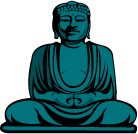
“This is a symbol of those trying to get closer to Buddhism, and it is to remove physical attraction,” said Supak Wungseecoon, a Buddhist monk who attends Palo Alto College.
Buddhism is a growing
religion in the United States, but it is still not completely understood
by many Americans. Most people don’t know that it is similar to other
religions, like Christianity.
“One of the teachings in Buddhism, and all spiritual paths, is to
simplify,” said Dr. Dorothy Haecker, professor of World Religions.
“A shaved head is part of that simplicity.”
Buddhism began 2,500
years ago with the birth a prince named Siddhartha Guatama, who was born
to wealth and privilege in what is now modern-day Nepal. His father brought
him up with the finest of luxuries and protected him from ever seeing
the suffering of the outside world. Guatama became filled with sorrow
when he went outside the palace for the first time and saw three things
he had not seen before: an old man, a sick man and a corpse. He decided
to renounce his kingdom and seek a way out of human suffering.
When Siddhartha became enlightened to the true nature of our human condition,
he became known as Buddha, or ‘the Awakened One.’
Buddhism has branched out into several different sects but basic to the
teachings of Buddha is the worth of all living beings, respect and compassion
for life, and finding the path to enlightenment through understanding
of the self and how the mind works.
Buddha believed individuals were capable of stopping rebirth and suffering
by ending desire and doing good deeds or ‘karma.’
“I would call Buddhism the way of compassion,” said Haecker.
“Buddha thought of suffering as the great teacher. When we do that
which is not rightful, we suffer.”
Buddhism asks fundamental questions about our existence, like why humans
suffer, and why we are here.
“We don’t know what we are and why we are here. Why the land?
Why the trees? Why the sky?” said Wungseecoon. “That’s
one of the reasons I became Buddhist. Maybe there is a good answer for
this, beyond sciences or the scientific field.”
Buddhism and Christianity are not often compared. Father Effendy Liwang
of St. Anthony de Padua Catholic Church is now a Catholic priest, but
he was raised a Buddhist in Indonesia.
“I went to the temple every Sunday. We would do chanting and meditation,”
said Liwang. “The thing I can remember is always doing good things
to other people…so you could be reborn to be a better person.”
Father Liwang became interested in Catholicism when he attended a Catholic
high school in Indonesia.
“All your friends went to a church and you did not, and slowly you
want to learn more about it,” said Liwang. “In Catholicism,
I like the social justice issues.”
Liwang said that even though he is a Catholic now, he is very comfortable
with centering meditation, a Buddhist practice that originated in India.
“Basically, you try to concentrate on God and stay with that as long
as you can.”
The Buddha learned meditation from the great teachers of his time. “Meditation
is done in order to gain concentration,” said Wungseecoon. Meditation
is a way of looking at the mind and seeing how we experience the world,
how we feel about it, and how we react to it in order to better understand
ourselves and find peace.
“If you go to the heart of the original teachings of the founders
of these two religions, you will find remarkable similarities,” said
Haecker. “Jesus was a pacifist, as was Buddha. They both taught loving
kindness.”
In Buddhism, the point is not to worry about externals. “If a scientist
invented you—your eyes, your ears—you would say, ‘Oh! How
wonderful!,’ looking down at his hands and smiling at ‘the invention,’
Wungseecoon continued. “We are already powerful.”